The Intel Core i7-8086K Review
by Ian Cutress on June 11, 2018 8:00 AM EST- Posted in
- CPUs
- Intel
- Core i7
- Anniversary
- Coffee Lake
- i7-8086K
- 5 GHz
- 8086K
- 5.0 GHz
Benchmarking Performance: CPU Legacy Tests
Our legacy tests represent benchmarks that were once at the height of their time. Some of these are industry standard synthetics, and we have data going back over 10 years. All of the data here has been rerun on Windows 10, and we plan to go back several generations of components to see how performance has evolved.
All of our benchmark results can also be found in our benchmark engine, Bench.
3D Particle Movement v1
3DPM is a self-penned benchmark, taking basic 3D movement algorithms used in Brownian Motion simulations and testing them for speed. High floating point performance, MHz and IPC wins in the single thread version, whereas the multithread version has to handle the threads and loves more cores. This is the original version, written in the style of a typical non-computer science student coding up an algorithm for their theoretical problem, and comes without any non-obvious optimizations not already performed by the compiler, such as false sharing.
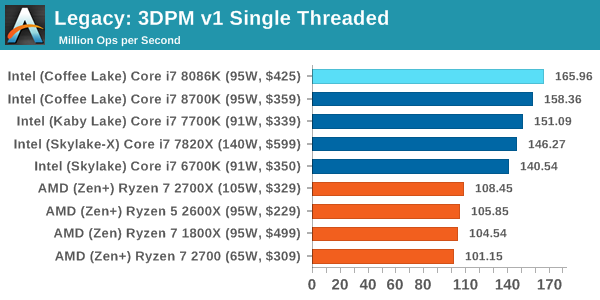
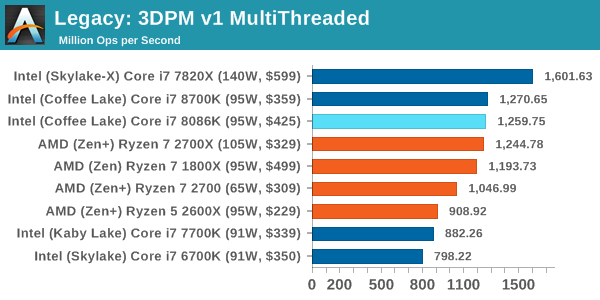
CineBench 11.5 and 10
Cinebench is a widely known benchmarking tool for measuring performance relative to MAXON's animation software Cinema 4D. Cinebench has been optimized over a decade and focuses on purely CPU horsepower, meaning if there is a discrepancy in pure throughput characteristics, Cinebench is likely to show that discrepancy. Arguably other software doesn't make use of all the tools available, so the real world relevance might purely be academic, but given our large database of data for Cinebench it seems difficult to ignore a small five minute test. We run the modern version 15 in this test, as well as the older 11.5 and 10 due to our back data.
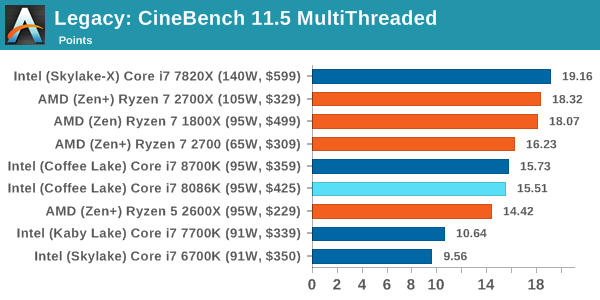
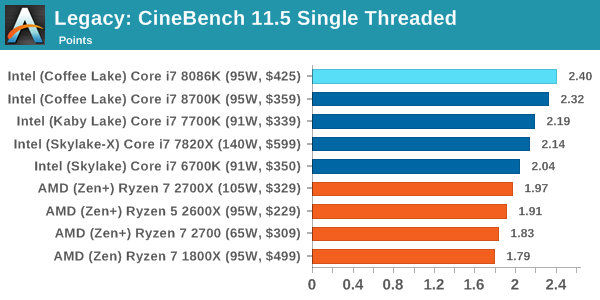
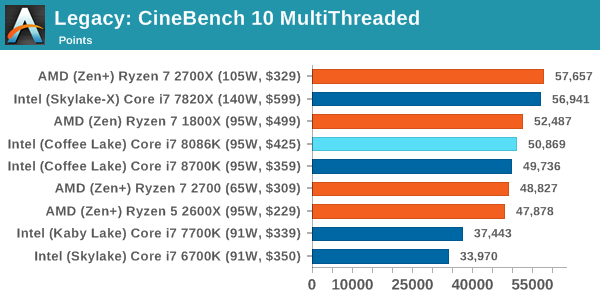

x264 HD 3.0
Similarly, the x264 HD 3.0 package we use here is also kept for historic regressional data. The latest version is 5.0.1, and encodes a 1080p video clip into a high quality x264 file. Version 3.0 only performs the same test on a 720p file, and in most circumstances the software performance hits its limit on high end processors, but still works well for mainstream and low-end. Also, this version only takes a few minutes, whereas the latest can take over 90 minutes to run.
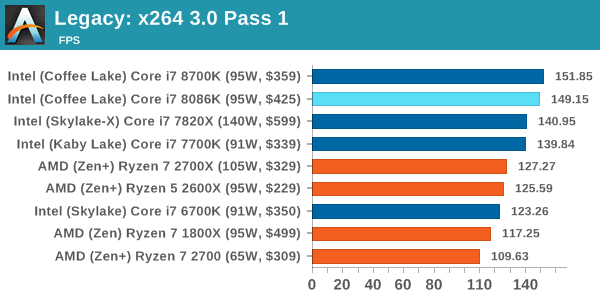
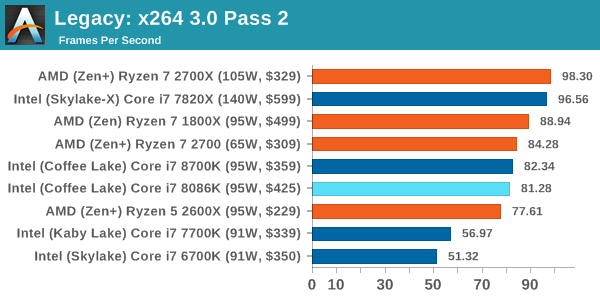










111 Comments
View All Comments
bug77 - Monday, June 11, 2018 - link
So what happened here? It looks like Intel's play with frequencies made this throttle more often. At least that the only explanation I can find for 8700k ending up better in so many tests.Tkan215215 - Monday, June 11, 2018 - link
As always its called milking and wallet ripper they know people still Buy them anywaybug77 - Monday, June 11, 2018 - link
I wasn't expecting this to be a cost-effective part, but rather a collector-oriented one.But mostly worse than a standard part is surely unexpected.
AutomaticTaco - Monday, June 11, 2018 - link
I don't think it's worse as much as the silicon lottery exists regardless of it. In other words, even among speed binned parts some OC better than others. And that's true for both the 8086K, the 8700K or any others.just4U - Wednesday, June 13, 2018 - link
I agree bug,I'd be very interested in this processor if it brought something to the table to justify it's cost. The 4790K did with a better thermal design. They could have added a kick ass cooler, or a factory delid and redo for better thermals. Something .. anything besides a small bump in clocks.
Drumsticks - Monday, June 11, 2018 - link
It might be milking, but I kind of have a hard time believing that. They're only making 50,000 of them, and only at about a 21% markup over the 8700k. But they're flat out giving away 16% of the chips. I doubt Intel is going to milk much money beyond their regular business from this. It's the companies 50th anniversary year, so I'm going to guess it's just positive fanfare and a collector's item related to that and it happening to be an anniversary for a well known processor at the same time.Old_Fogie_Late_Bloomer - Monday, June 11, 2018 - link
I enjoy hating Intel as much as the next guy but this is a good point.Revenue from 41,914 8086Ks: $17,813,450
Revenue from 50,000 8700Ks: $17,500,000 (at $350 apiece)
The remaining $313,450 doesn't really feel like a lot of money when you factor in binning the chips and dealing with all the other overhead of the promotion, especially since Intel isn't getting all of that money anyway.
SanX - Monday, June 11, 2018 - link
This was actually not the revenue but the PROFIT you blind people with easily effed brains. The production cost for this chip was probably less then 20 bucks. The processor in your phone is probably more hi-tech, has more transistors, more cores, and was made on more advances factories with 10nm litho being all sold below $25.mkaibear - Tuesday, June 12, 2018 - link
What are you smoking?His maths is bang on, although he neglects the cut the retailer will be taking off the top for that. They aren't making that much profit off each chip.
SanX - Tuesday, June 12, 2018 - link
They aren't making that much profit off each chip? If they aren't making huge profits then all mobile chip factories lose money by selling the same transistor count processors like the one in Apple or Samsung phones for just $25